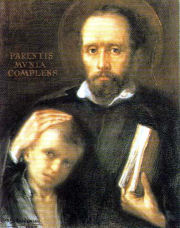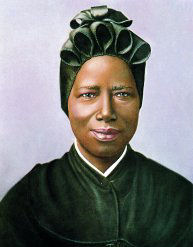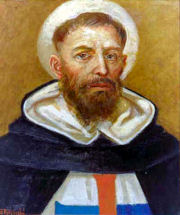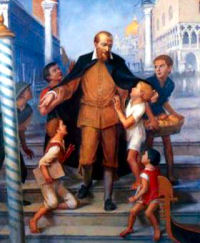Daily Readings for: February 08, 2013
(Readings on USCCB website)
Collect: O God, Father of mercies, who sent Saint Jerome Emiliani as a helper and father to orphans, grant through his intercession, that we may preserve faithfully the spirit of adoption, by which we are called, and truly are, your children. Through our Lord Jesus Christ, your Son, who lives and reigns with you in the unity of the Holy Spirit, one God, for ever and ever.
O God, who led Saint Josephine Bakhita from abject slavery to the dignity of being your daughter and a bride of Christ, grant, we pray, that by her example we may show constant love for the Lord Jesus crucified, remaining steadfast in charity and prompt to show compassion. Through our Lord Jesus Christ, your Son, who lives and reigns with you in the unity of the Holy Spirit, one God, for ever and ever.
RECIPES
ACTIVITIES
PRAYERS
LIBRARY
Ordinary Time: February 8th
Optional Memorials of St. Jerome Emiliani, priest; St. Josephine Bakhita, virgin
Old Calendar: St. John of Matha, confessor
St. Jerome Emiliani was born in Venice in 1486. He converted to Christianity after a rather dissolute youth, and dedicated himself to the service of the poor, the sick, and abandoned children. He founded a congregation (Somaschi) which looked after the education of children, especially orphans. He died of the plague while serving the afflicted.
Saint Josephine was a young Sudanese girl sold into slavery and brought to Italy where, while serving as a nanny, she was sent to live with the Canossian Sisters of the Institute of the Catechumens in Venice. There she was baptized, and, having reached majority age, was granted her freedom by Italian law. In 1896 she joined the Canossian Daughters of Charity where she served humbly for the next twenty five years. She died after a long and painful illness, during which she would cry out to the Lord: "Please loosen the chains... they are so heavy!" Her dying words were "Our Lady! Our Lady!"
According to the 1962 Missal of Bl. John XXIII the Extraordinary Form of the Roman Rite, today is the feast of St. John of Matha, who came from Provence, France and was ordained a priest in Paris. He retired to a solitary life conscious that God was calling him to a special mission, and spent three years in prayer and recollection. He then founded the Trinitarian Order for the ransom of Christians held by the Mohammedans. A great number of houses were founded and innumerable prisoners set free. St. John spent the last two years of his life in Rome, where he died.
St. Jerome Emiliani
 A careless and irreligious soldier for the city-state of Venice, Jerome was captured in a skirmish at an outpost town and chained in a dungeon. In prison Jerome had a lot of time to think, and he gradually learned how to pray. When he escaped, he returned to Venice where he took charge of the education of his nephews—and began his own studies for the priesthood.
A careless and irreligious soldier for the city-state of Venice, Jerome was captured in a skirmish at an outpost town and chained in a dungeon. In prison Jerome had a lot of time to think, and he gradually learned how to pray. When he escaped, he returned to Venice where he took charge of the education of his nephews—and began his own studies for the priesthood.
In the years after his ordination, events again called Jerome to a decision and a new lifestyle. Plague and famine swept northern Italy. Jerome began caring for the sick and feeding the hungry at his own expense. While serving the sick and the poor, he soon resolved to devote himself and his property solely to others, particularly to abandoned children. He founded three orphanages, a shelter for penitent prostitutes and a hospital.
Around 1532 Jerome and two other priests established a congregation dedicated to the care of orphans and the education of youth. Jerome died in 1537 from a disease he caught while tending the sick. He was canonized in 1767. In 1928 Pius XI named him the universal patron of orphans and abandoned children.
— Excerpted from Saint of the Day, Leonard Foley, O.F.M.
Patron: Abandoned people; orphans.
Symbols: Ball and chain; man shackled with a ball and chain who is attending the sick; man wearing a ball and chain, and receiving an apparition of Mary and the Child Jesus.
Things to Do:
- Read more about St. Jerome: Life of St. Jerome
- Meditate on these words: "Before dying, Jerome gives to his own a testament that is not only the synthesis of his spiritual experience, but also an itinerary of Christian life: Follow the way of the Crucified, despise the world, love one another, serve the poor. The life of love for the poor is born from a community of people who live the commandment of the reciprocal love, after having decided to have, as a goal, only God. The cross becomes the expression of this dedication and love, on the example of Jesus Christ."
- We suggest you visit the Somascan Fathers and Brothers' website where you can read St. Jerome's letters written in 1535 as well as other documents and you can also learn more about this religious community.
St. Josephine Bakhita
 For many years, Josephine Bakhita was a slave, but her spirit was always free and eventually that spirit prevailed. Born in Olgossa in the Darfur region of southern Sudan, Josephine was kidnapped at the age of seven, sold into slavery and given the name Bakhita, which means fortunate. She was resold several times, finally in 1883 to Callisto Legnani, Italian consul in Khartoum, Sudan.
For many years, Josephine Bakhita was a slave, but her spirit was always free and eventually that spirit prevailed. Born in Olgossa in the Darfur region of southern Sudan, Josephine was kidnapped at the age of seven, sold into slavery and given the name Bakhita, which means fortunate. She was resold several times, finally in 1883 to Callisto Legnani, Italian consul in Khartoum, Sudan.
Two years later he took Josephine to Italy and gave her to his friend Augusto Michieli. Soon Bakhita became babysitter to Mimmina Michieli, whom she accompanied to Venice's Institute of the Catechumens, run by the Canossian Sisters. While Mimmina was being instructed, Josephine felt drawn to the Catholic Church. She was baptized and confirmed in 1890, taking the name Josephine.
When the Michielis returned from Africa and wanted to take Mimmina and Josephine back with them, the future saint refused to go. During the ensuing court case, the Canossian sisters and the patriarch of Venice intervened on Josephine's behalf. The judge concluded that since slavery was illegal in Italy, she had actually been free since 1885.
Josephine entered the Institute of Saint Magdalene of Canossa in 1893 and made her profession three years later. In 1902, she was transferred to the city of Schio (northeast of Verona), where she assisted her religious community through cooking, sewing, embroidery and welcoming visitors at the door. She soon became well loved by the children attending the sisters' school and the local citizens. She once said, "Be good, love the Lord, pray for those who do not know Him. What a great grace it is to know God!"
The first steps toward her beatification began in 1959. She was beatified in 1992 and canonized eight years later.
— Excerpted from Saint of the Day, Leonard Foley, O.F.M.
"Be good, love the Lord, pray for those who do not know him. What a great grace it is to know God!". — St. Josephine Bakhita
Things to Do:
- Visit these websites for more about the life of St. Josephine: Josephine Bakhita (Vatican's biography); Josephine Bakhita - an African Saint (Has links to information about the Faith in Africa and the persecution which continues); Black Catholics: Josephine Bakhita (Life Historical Timeline)
- The Canossian Daughters of Charity are called to contemplate, experience and share God's love for every person and to participate in Christ's mission of salvation in a life of total dedication to God, communion and humble service with Mary, mother of love beneath the cross. Learn more about the Canossian Daughters of Charity, the order in which St. Josephine became a professed religious.
- A Sister seeing St. Josephine so peaceful and always in prayer, asked, "Do you wish to go to heaven?" "I wish neither to go nor to stay. God knows where to find me, when He wants me." To another who asked how she was going on, she answered, "I am going slowly, step by step, because I have two heavy bags to carry - one containing my own sins, the other Christ's merits. When I get to the other side, I will open my bags and say, 'Eternal Father, now judge!' and to St Peter, 'You can close that door of yours, for I'm going to stay.'" More autobiographical excerpts from St. Josephine's wonderful story can be found here.
- Pray for those suffering persecution in Sudan. Read what Bishop Macram Max Gassis says in this article, Sudan: Country of Terrorism, Religious Persecution, Slavery, Rape, Genocide, and Man-Made Starvation and this statement from the Sudan Catholic Bishops' Regional Conference.
St. John of Matha
 John of Matha, the founder of the Trinitarian Order, was born at Faucon, on the borders of Provence, in France. He was trained as a young noble in horsemanship and the use of arms, decided to study for the priesthood, and was ordained in Paris. After some years in solitude, he conceived the idea of founding an order to ransom Christian captives from the Muslims and went to Rome to obtain the blessing of Pope Innocent III.
John of Matha, the founder of the Trinitarian Order, was born at Faucon, on the borders of Provence, in France. He was trained as a young noble in horsemanship and the use of arms, decided to study for the priesthood, and was ordained in Paris. After some years in solitude, he conceived the idea of founding an order to ransom Christian captives from the Muslims and went to Rome to obtain the blessing of Pope Innocent III.
Houses of the order were established at Cerfroid and Rome and in Spain. He was very successful in the work of ransoming captives and his order spread. Very little is known for certain about his life, and in the fifteenth and sixteenth centuries, to bolster his reputation, certain members of his order fabricated stories about him, filled his life with miracles and amazing adventures, and connected the beginnings of his order with St. Felix of Valois.
The Trinitarian Order had not preserved any archives of their order and had little knowledge of the life of their founder. Another order, the Order of Mercy, was founded for the same reason as their own, and they compiled a fictitious record of the beginnings of their order. This takes nothing away from the achievements of St. John of Matha, but it does obscure the true story of his life and work.
We do know that he received approval of his order from Pope Innocent III in 1198 and that he died in Rome in 1213. His relics were taken to Madrid in 1655, and he was recognized as a saint in 1694. At his death, there were thirty-five houses of the order throughout Europe. The Trinitarians were one of the first religious orders to combine monastic discipline with pastoral work and one of the first to become international in its work. The order flourishes today in several countries and in 1906 made a foundation in the United States.
Excerpted from The One Year Book of Saints, Rev. Clifford Stevens
Patron: Against lightning; against pestilence; archers; automobile drivers; automobilists; bachelors; Baden, Germany; boatmen; bookbinders; Brunswick, Germany; bus drivers; cab drivers; epilepsy; epileptics; floods; fruit dealers; fullers; gardeners; hailstorms; holy death; lightning; lorry drivers; mariners; market carriers; Mecklenburg, Germany; motorists; pestilence; porters; Rab Croatia; sailors; Saint Christopher's Island; Saint Kitts; storms; sudden death; taxi drivers; toothache; Toses, Girona, Catalonia, Spain; transportation; transportation workers; travellers; truck drivers; truckers; watermen.
Symbols: Branch; giant; torrent; tree; man with Christ on his shoulders.
Things to Do:
- Like Mother Teresa of Calcutta, St. John of Matha saw a critical need for the Church at the time and set about doing something about it. He devoted all of his time, his efforts, and his resources to ransom his fellow Christians from slavery, and his work continued into modern times, until slavery was abolished. Like him, we should look around us and see what good has to be done and then courageously put our hand to the task.
- Read a longer biography of St. John.

 A careless and irreligious soldier for the city-state of Venice, Jerome was captured in a skirmish at an outpost town and chained in a dungeon. In prison Jerome had a lot of time to think, and he gradually learned how to pray. When he escaped, he returned to Venice where he took charge of the education of his nephews—and began his own studies for the priesthood.
A careless and irreligious soldier for the city-state of Venice, Jerome was captured in a skirmish at an outpost town and chained in a dungeon. In prison Jerome had a lot of time to think, and he gradually learned how to pray. When he escaped, he returned to Venice where he took charge of the education of his nephews—and began his own studies for the priesthood.  For many years, Josephine Bakhita was a slave, but her spirit was always free and eventually that spirit prevailed. Born in Olgossa in the Darfur region of southern Sudan, Josephine was kidnapped at the age of seven, sold into slavery and given the name Bakhita, which means fortunate. She was resold several times, finally in 1883 to Callisto Legnani, Italian consul in Khartoum, Sudan.
For many years, Josephine Bakhita was a slave, but her spirit was always free and eventually that spirit prevailed. Born in Olgossa in the Darfur region of southern Sudan, Josephine was kidnapped at the age of seven, sold into slavery and given the name Bakhita, which means fortunate. She was resold several times, finally in 1883 to Callisto Legnani, Italian consul in Khartoum, Sudan.  John of Matha, the founder of the Trinitarian Order, was born at Faucon, on the borders of Provence, in France. He was trained as a young noble in horsemanship and the use of arms, decided to study for the priesthood, and was ordained in Paris. After some years in solitude, he conceived the idea of founding an order to ransom Christian captives from the Muslims and went to Rome to obtain the blessing of Pope Innocent III.
John of Matha, the founder of the Trinitarian Order, was born at Faucon, on the borders of Provence, in France. He was trained as a young noble in horsemanship and the use of arms, decided to study for the priesthood, and was ordained in Paris. After some years in solitude, he conceived the idea of founding an order to ransom Christian captives from the Muslims and went to Rome to obtain the blessing of Pope Innocent III.